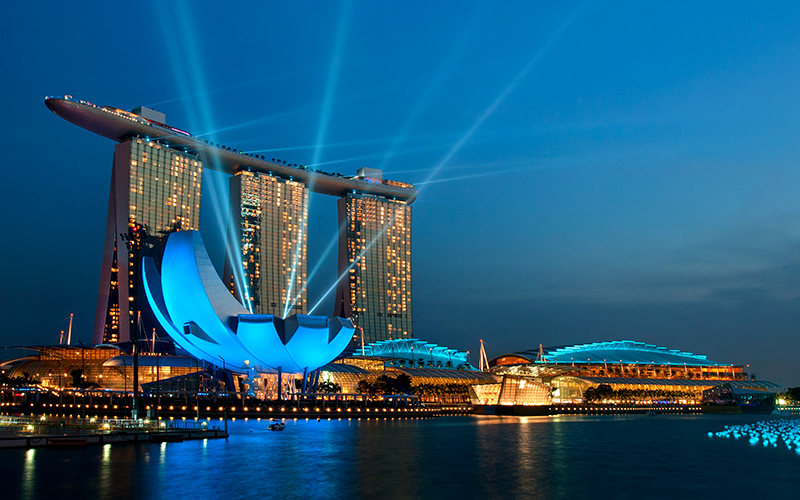Podcast Audio Transcript
Alisha: Hello listeners, this is Alisha; thank you for tuning in to yet another exciting and informative podcast from us at Infosys BPM. Today, we are discussing Singapore, the Lion City, and the world of opportunities it presents. And to talk about this, we have here with us, Abhinav Agnihotri, who is the head of
Infosys BPM’s Singapore operations. Welcome Abhinav. How are you today?
Abhinav: Thank you, Alisha. I am doing great. Glad to be here.
Alisha: Abhinav, let me ask you about 2020, one of the most challenging years all of us have had. How has the year been for Infosys BPM’s operations in Singapore?
Abhinav: I can best describe 2020 as a year of challenges and changes, and it was quite a journey. When the pandemic hit, we all hoped it wouldn’t spread across the world.
I remember getting an instant message on Feb 6th from the Singapore Government that we are now moving to Code Orange. Although it did not mean a complete lockdown, for us it was like a wake-up call.
We immediately accelerated our preparation for the worst-case scenario, and within a short period of time, we were ready with our business continuity and execution plans.
We kept our clients apprised of our activities and initiatives at every stage. Once the stay at home order came into effect, we enabled 100% of our employees to work from home in less than 24 hours.
It was a tough year, but the silver lining was the emergence of leaders during the crisis. Like all our locations around the globe, our Singapore centre also saw some great examples of our employees pushing the boundaries to ensure business as usual and beyond.
Alisha: The speed with which you acted is truly inspiring. Moving on, over the last few years, many global corporations have been setting up base in Singapore. Why are many companies viewing Singapore as an important business location?
Abhinav: Singapore has worked hard to implement forward-looking policies to help businesses grow and encourage innovation and trade.
It is regarded as one of the world’s freest economies, and enjoys one of the simplest and most favourable tax systems.
Do you know that Deloitte ranked Singapore as the second-best international wealth centre in 2018? The World Economic Forum also gave Singapore top ranking for competitiveness.
A stable political environment, world-class infrastructure, and a highly skilled local talent pool make Singapore one of the most strategic locations in the world for any business. These are the reasons why companies find it very attractive to set up their offices here.
Alisha: Those are amazing credentials for the city state. Could you provide an idea on how well positioned Singapore is for the BPM industry and Infosys BPM in particular?
Abhinav: Singapore is known as a centre of excellence, particularly in the area of high-end BPM services. We at Infosys BPM are well-positioned to provide BPM services in niche industries and support the double byte language requirements of Asian countries.
For instance, one of these industries is Financial Services; this industry operates in a time-sensitive environment and requires high security. As you well know, finance requires specialized skill sets for daily operations. At our Singapore centre, this is supported by our robust infrastructure and ready pool of bilingual, skilled manpower.
Singapore is growing fast to be one of the biggest BPM markets in the world.
Infosys BPM is a key employer in Singapore, and we are looking at rapid growth in this region in the coming years.
Alisha: That’s refreshing! Never knew the BPM industry was flourishing so much in Singapore. That brings me to the talent in the region. Is Singapore well positioned in terms of talent competitiveness?
Abhinav: Singapore is home to the largest number of global Fortune 500 headquarter jobs as compared to any other major Asian hub. According to the Global Talent Competitiveness Index of 2018, Singapore’s talent takes the lead across various industries within Asia Pacific.
The bilingual education system also means that talent here is proficient in English and at least one other language, such as Mandarin, Bahasa, Melaya, or Tamil.
Let me share some credentials:
- Singapore has been ranked 1st in Asia and 10th in the world for talent competitiveness, according to the IMD World Talent Ranking of 2019.
- According to INSEAD’s Global Talent Competitiveness Index of 2020, Singapore ranks as the third most attractive destination for global talent.
With one of the highest literacy rates of 98%, Singapore is a great market for Infosys BPM to expand our footprint and grow our presence.
Alisha: Very encouraging to know that Singapore sets an example for the world at large. With a majority of technology firms having their presence in the area, is it fair to say that Singapore is the Asian version of Silicon Valley?
Abhinav: A lot of what makes Singapore very attractive to tech companies today can be credited to government initiatives that have been in play for more than a decade now. Around 80 of the world’s top 100 technology firms have a prominent presence in the tiny island of Singapore. Many of them have been here for quite some time, including Google, IBM, and Microsoft.
According to the Singapore Economic Development Board (EDB), foreign investment into Singapore last year broke a 12-year record, with businesses committing investments totalling S$17.2 billion, which is also expected to produce more than 19,000 jobs.
Singapore’s strong fundamentals, business-friendly reputation, and strategic location in the heart of South-East Asia continue to make the state highly attractive for tech companies that wish to set up base here.
Last year, a KPMG survey of global technology insiders placed Singapore at the top spot of leading tech innovation hubs outside of San Francisco, beating cities such as London, Tel Aviv, Tokyo, New York, and Shanghai, which ranked second to sixth in that order.
Singapore is a cosmopolitan city in terms of technology, entrepreneurship, and access to capital.
So, I would say that this island state is unique and does not really need to benchmark itself against Silicon Valley.
The pandemic may have slowed investments and business expansion momentum around the world, but technology innovation and investments are gradually picking up pace again in Singapore.
Alisha: That was a brilliant discussion we had today Abhinav. I sure have learnt quite a bit about Singapore and its uniqueness in the global scene. I’d like to thank you for taking your time to come to the podcast and share your thoughts.
Abhinav: Thank you very much for having me.
Alisha: Dear listeners, if you enjoyed our podcast today, please don’t forget to share and like it on social media. Our social handles are mentioned in the podcast page. The podcast will be available on various platforms like Google Podcasts and Spotify, in addition to our website.
Also, if you have any queries, do reach out to us through the email address on the podcast description. Watch this space for more exciting podcasts coming up. Once again, thank you for tuning in, stay healthy and socially distanced. Have a nice day!





